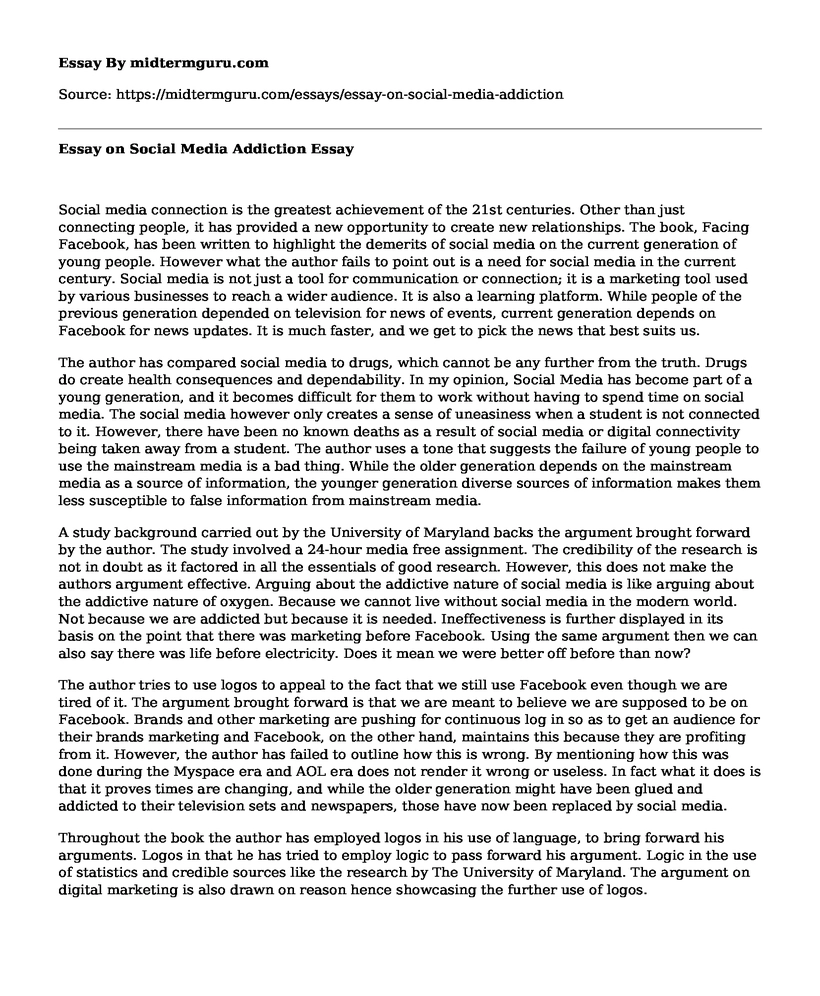Social media connection is the greatest achievement of the 21st centuries. Other than just connecting people, it has provided a new opportunity to create new relationships. The book, Facing Facebook, has been written to highlight the demerits of social media on the current generation of young people. However what the author fails to point out is a need for social media in the current century. Social media is not just a tool for communication or connection; it is a marketing tool used by various businesses to reach a wider audience. It is also a learning platform. While people of the previous generation depended on television for news of events, current generation depends on Facebook for news updates. It is much faster, and we get to pick the news that best suits us.
The author has compared social media to drugs, which cannot be any further from the truth. Drugs do create health consequences and dependability. In my opinion, Social Media has become part of a young generation, and it becomes difficult for them to work without having to spend time on social media. The social media however only creates a sense of uneasiness when a student is not connected to it. However, there have been no known deaths as a result of social media or digital connectivity being taken away from a student. The author uses a tone that suggests the failure of young people to use the mainstream media is a bad thing. While the older generation depends on the mainstream media as a source of information, the younger generation diverse sources of information makes them less susceptible to false information from mainstream media.
A study background carried out by the University of Maryland backs the argument brought forward by the author. The study involved a 24-hour media free assignment. The credibility of the research is not in doubt as it factored in all the essentials of good research. However, this does not make the authors argument effective. Arguing about the addictive nature of social media is like arguing about the addictive nature of oxygen. Because we cannot live without social media in the modern world. Not because we are addicted but because it is needed. Ineffectiveness is further displayed in its basis on the point that there was marketing before Facebook. Using the same argument then we can also say there was life before electricity. Does it mean we were better off before than now?
The author tries to use logos to appeal to the fact that we still use Facebook even though we are tired of it. The argument brought forward is that we are meant to believe we are supposed to be on Facebook. Brands and other marketing are pushing for continuous log in so as to get an audience for their brands marketing and Facebook, on the other hand, maintains this because they are profiting from it. However, the author has failed to outline how this is wrong. By mentioning how this was done during the Myspace era and AOL era does not render it wrong or useless. In fact what it does is that it proves times are changing, and while the older generation might have been glued and addicted to their television sets and newspapers, those have now been replaced by social media.
Throughout the book the author has employed logos in his use of language, to bring forward his arguments. Logos in that he has tried to employ logic to pass forward his argument. Logic in the use of statistics and credible sources like the research by The University of Maryland. The argument on digital marketing is also drawn on reason hence showcasing the further use of logos.
Cite this page
Essay on Social Media Addiction. (2021, Jun 22). Retrieved from https://midtermguru.com/essays/essay-on-social-media-addiction
If you are the original author of this essay and no longer wish to have it published on the midtermguru.com website, please click below to request its removal:
- Eminem as the Greatest Rapper - Art Essay Example
- Analysis of Acting in Oklahoma Musical - Paper Example
- Essay on Why Foreign Aid Is Hurting Africa Article by Dambisa Moyo
- Reflective Essay on Choreographic Music Video
- Reflective Paper on Art and Architecture: The Art Institute of Chicago
- Annotated Bibliography on Italian Cinema: From Hollywood to Realism
- Exploring Movement in the Air: Engaging With the National Space and Air Museum - Essay Sample







